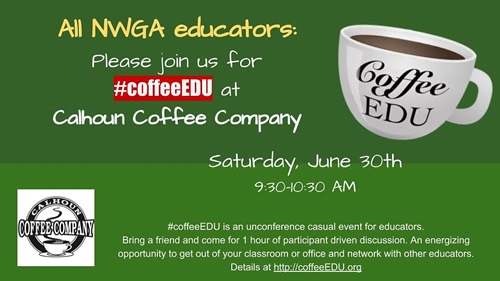By now the term professional learning network (PLN) is used very often, but much of the time it refers to the virtual type, meaning our online colleagues and networks. Being a media specialist can be a lonely profession and it’s not uncommon to feel like we’re siloed. As I have moved from being a classroom teacher into teacher leader positions, I’ve noticed it can get lonely and I find myself looking for a face-to-face tribe. Although I find this at conferences, they are infrequent and expensive.
So how can media specialists get out from the media center and network with like-minded educators without flying to ISTE or AASL? By getting involved in the “unconference” movement. Here are three different ways to do just that!
1. CoffeeEDU
I first encountered CoffeeEDU as “CoffeeCUE” and thought, “Cool. I like coffee.”
Fast forward a few months and it’s changed my professional life. Because of my current work, which involves working with educators in almost two dozen schools, I have a small peer group. Before moving to this position, I ran across the CoffeeEDU model and decided to attend a meetup—and instantly loved how this meetup, with no agenda or formal presentation, was more like a support group than a professional learning event. Despite that, I learned more in one hour than I had in several all-day formal sessions. I was hooked and soon organized my own local CoffeeEDU meetup closer to my home.
Every month, at CoffeeEDU, attendees get to spend time with area educators in a relaxed atmosphere away from the school and/or office. In this “safe space” we share the trials, triumphs, and tumults of our work with a group that both understands and shares the same mission. Here, I learned to cater training sessions to the trainees, not around the tool. We relish our time together as we regroup and rebuild before going back to our respective fields of battle.
Ready to host your own CoffeeEDU? It’s a great way to build community at your school or to network with other media specialists and educators.
2. Edcamps
Imagine 150 to 200 teachers voluntarily coming to a professional learning opportunity on a Saturday—without pay and with no agenda. Sounds crazy? It’s happening a lot.
On a larger scale, though less frequently, edcamps help us do the same as CoffeeEDU. To host an Edcamp, pick a date and bring a roll of masking tape to make a grid for sessions. Attendees post topics they’re interested in on sticky notes and people learn tons from people just like you. There are no presenters at edcamps, but someone starts the conversation and others share their notes. Most formal edcamps get sponsors to host breakfast and then offer a half day or full day of learning delivered by—you guessed it—the attendees!
If you’ve already attended an edcamp, it may be time to organize your own.
3. Twitter
Interestingly, I discovered both of these real-life events via Twitter. Taking a few minutes a day online to catch some tweets has made a profound difference in my educational practice and brought “virtual” people into my face-to-face life. I could never have imagined how much richer my life would be from interacting, reflecting, and inviting others in. I started using Twitter by following a keynote speaker and presenter at our local state tech conference in 2009. I followed some of the people they followed and found that when I posted, a few people followed me. Today, I have more than 10,500 tweets and more than 1,500 followers.
As the saying goes, Twitter is like a waterfall—always flowing—and it’s better to jump in from time to time to catch a few drops rather than trying to catch everything. I turn on notifications for the accounts and people that I really want to follow (@GoogleForEdu, my local district, our edcamp) and I participate in our state educational technology and media specialist chats, #TechTalkGA and #GaLibChat. Other than that, I just “catch what I can” and move on.
To get started on Twitter, try searching a hashtag that interests you: #edtech, #futurereadyschools, #publicschools. Alternatively, you could try a Twitter chat. Two I recommend are #edtechchat and #futurereadylibchat. This calendar lists many more chats.
Though not a face-to-face environment, Twitter is a great way to discover face-to-face meetups as these are advertised heavily through the social media platform. Many conferences and presenters run active social media accounts that invariably lead to opportunities to meet other attendees and locate like-minded individuals in your area. At a recent CoffeeEDU meetup, I realized that I had met four other attendees through social media before meeting them in real life.
Virtual (enhances) reality
Regardless of the venue, whether it’s a conference, an unconference, or smaller collaborative event, it’s evident that educators value and seek out face-to-face interactions. Watching our peers share their successes and having organic conversations without presenters or pretense helps all of us know that we are not alone and that we have new things to master and share.
- Using universal screening to improve student well-being - April 22, 2024
- 3 ways to avoid summer learning loss - April 19, 2024
- High school students say AI will change the workforce - April 18, 2024


